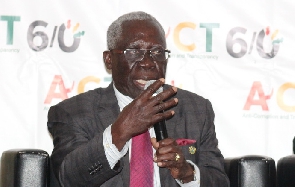 Dr Stephen Kwabena Opuni, former Chief Executive Officer (CEO) of the Ghana COCOBOD
Dr Stephen Kwabena Opuni, former Chief Executive Officer (CEO) of the Ghana COCOBOD
Investigations conducted by the Ghana Cocoa Board (Cocobod) indicate that the agro-chemicals supplied by Agricult Ghana Limited and others were “untested, improperly tested and substandard.”
According to the investigative report stumbled on by DAILY GUIDE, the processes leading to the issuance of licence to the companies, including Agricult Ghana Limited, for the supply of some agro-chemicals such as fertilizers, were highly compromised because the period of the testing was short-circuited.
There is a pending criminal prosecution against former COCOBOD Chief Executive, Dr Stephen Kwabena Opuni, together with Agricult Ghana Limited and its Managing Director, Seidu Agongo.
They have been charged with causing financial loss to the state following the investment of millions of dollars into the Lithovit Fertilizer supplied by the private company but found to be adulterated, according to the state.
There have been reports that Agricult’s Lithovit Fertilizer supplied to COCOBOD was approved by the Cocoa Research Institute of Ghana (CRIG) – a subsidiary of COCOBOD – and therefore, the company did nothing untoward.
The investigative report shows that the COCOBOD management set up a disciplinary committee to investigate the alleged malpractices in the testing of some agro-chemicals at CRIG, Tafo, and the committee in the end made damning findings against Dr Opuni and Alexander Asante Afrifa of CRIG.
The four-member disciplinary committee chaired by Dr Yaw Adu-Ampomah, Cocobod’s Deputy Chief Executive, Agronomy and Quality Control, was set up on 4th October, 2017 to investigate the alleged malpractice in the testing of some agro-chemicals at CRIG.
Among other things, the committee investigated the process of testing and the issuance of certificates to Duapa Fertilizer, Lithovit Fertiliser and Acati Power Insecticide; and also investigated the conduct of staff involved in the testing and issuance of the certificates to the companies.
According to the report, 14 experts from CRIG and the Cocoa Health and Extension Division (CHED) appeared before it and in the final analysis, they found that “there were four agro-chemical products whose testing trials were alleged to be compromised.”
It said it analysed query responses from persons involved, testing reports, safety data sheet for Lithovit, report on samples tested by Ghana Standards Authority (GSA), as well as report on samples tested by Chemistry Department, University of Ghana.
According to the committee, it held sittings at Cocoa House on 9th, 12th and 20th October, 2017 to conduct the inquiry, saying, “There were four agro-chemical products whose testing trials were alleged to be compromised.”
The committee named the products as Duapa Fertilizer owned by Sarago Ltd,L; Lithovit Fertiliser owned by Agricult Gh Ltd; Metacide owned by Usico Ltd and Acati Power Insecticide owned by Alive Industries.
According to the committee, “The report on Lithovit was written by Alex Asante Afrifa without any input from Jerome Dogbatse and Dr. Alfred Arthur,” adding, “Lithovit Liquid fertilizer was not tested on cocoa by CRIG.”
It said that the Lithovit samples submitted “were not liquid but rather powder,” adding, “the trials that were conducted did not go through the full cycle and that it was only on two-month old seedlings.”
The committee said, “No trials were conducted on matured cocoa trees with Lithovit fertilizer. The recommendation to use Lithovit on matured cocoa trees is without scientific basis.”
According to the committee, Mr Alex Afrifa grossly misconduct himself when he issued a report claiming that field trials for testing on Lithovit and Duapa fertilizers had been conducted when in fact, it had not been done.
The committee said that the sample test report from the University of Ghana, Chemistry Department, clearly indicated that the samples of Lithovit submitted might be the fertilizer, Lithovit which was highly diluted,” adding “Its application on cocoa farms from nursery, growth and yield stages remains experimental because there is currently no evidence in relation for Lithovit application on cocoa plants.”
It said that the test report from the Chemistry Department showed that the Lithovit found in the sample examined “was very small and might compromise the outcome of its application.”
According to the committee, “The final test report from Ghana Standards Authority stated that the sample could not be classified as pesticide, fungicide or fertilizer. That sample had been adulterated and did not meet specifications of the standard and further the sample is not recommended for its intended purpose.”
The report concluded, “The sample cannot be used as foliar nutrient on cocoa farm nursery, growth and yield stages and is harmful to human, animal, as well as hazardous to water.”
The committee said that the certificate issued for Lithovit “was not for liquid fertilizer,” adding, “The then Chief Executive, Dr. Stephen Kwabena Opuni, in a letter dated 25th February, 2014 requested Agricult to quote for 700,000 litres of Lithovit fertilizer (ie liquid fertilizer) when Lithovit fertilizer had not been tested and approved.
“Agricult Company Limited submitted a quote for Lithovit fertilizer when they knew that they had not submitted Lithovit fertilizer for testing,” the committee held.
It also said, “Dr. Stephen Kwabena Opuni, the former Chief Executive, first signed a contract in the name of Cocobod for the supply of 700,000 litres of lithovit fertilizer for the sum of $19,250,000.00 in March 2014.”
The committee recommended, “The contract for the purchase of Lithovit liquid fertilizer should be abrogated and certificate for Lithovit liquid fertilizer should be withdrawn,” adding that “The appointment of Mr. Alex Asante Afrifa should be terminated for issuing the report on Lithovit.”
- Who is paying $10,000 for cocoa? - CGCI asks global cocoa buyers
- Ghana, Ivory Coast urged to adapt as cocoa prices soar
- Two arrested for smuggling 253 bags of cocoa beans
- Why the world of chocolate is in crisis
- Cocoa futures set another record to sell at $10,760 a ton as West African supply woes persist
- Read all related articles










